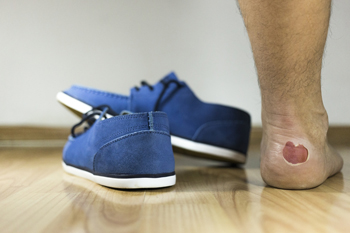 Blisters, small fluid-filled pockets, are a common annoyance most people experience throughout their lives. However, blisters can be particularly painful when formed on the foot due to its many nerves and blood vessels. Continuous friction and pressure may cause blisters, so it is advisable to refrain from wearing shoes or socks that have a tighter fit, and to avoid humid or damp environments. Extreme heat or burns may cause blisters as well as the opposite, such as frostbite. Another factor affecting the occurrence of blisters is contact dermatitis, or skin inflammation formed by irritants and allergies. Certain medical conditions may also influence the risk of blisters on the feet like chicken pox or eczema. Treatments for blisters may include: applying an ice pack wrapped in a thick towel, using blister bandages, raising the foot to reduce inflammation, keeping the area dry, and applying topical ointments to the blister and the surrounding skin. If a blister becomes discolored, extremely inflamed, or does not heal after a few days, it is advised you speak with a podiatrist to discuss the proper treatment.
Blisters, small fluid-filled pockets, are a common annoyance most people experience throughout their lives. However, blisters can be particularly painful when formed on the foot due to its many nerves and blood vessels. Continuous friction and pressure may cause blisters, so it is advisable to refrain from wearing shoes or socks that have a tighter fit, and to avoid humid or damp environments. Extreme heat or burns may cause blisters as well as the opposite, such as frostbite. Another factor affecting the occurrence of blisters is contact dermatitis, or skin inflammation formed by irritants and allergies. Certain medical conditions may also influence the risk of blisters on the feet like chicken pox or eczema. Treatments for blisters may include: applying an ice pack wrapped in a thick towel, using blister bandages, raising the foot to reduce inflammation, keeping the area dry, and applying topical ointments to the blister and the surrounding skin. If a blister becomes discolored, extremely inflamed, or does not heal after a few days, it is advised you speak with a podiatrist to discuss the proper treatment.
Blisters are prone to making everyday activities extremely uncomfortable. If your feet are hurting, contact one of our podiatrists of Active Foot and Ankle Care, LLC. Our doctors can provide the care you need to keep you pain-free and on your feet.
Foot Blisters
Foot blisters develop as a result of constantly wearing tight or ill-fitting footwear. This happens due to the constant rubbing from the shoe, which can often lead to pain.
What Are Foot Blisters?
A foot blister is a small fluid-filled pocket that forms on the upper-most layer of the skin. Blisters are filled with clear fluid and can lead to blood drainage or pus if the area becomes infected.
How Do Blisters Form?
Blisters on the feet are often the result of constant friction of skin and material, usually by shoe rubbing. Walking in sandals, boots, or shoes that don’t fit properly for long periods of time can result in a blister. Having consistent foot moisture and humidity can easily lead to blister formation.
Prevention & Treatment
It is important to properly care for the affected area in order to prevent infection and ease the pain. Do not lance the blister and use a Band-Aid to provide pain relief. Also, be sure to keep your feet dry and wear proper fitting shoes. If you see blood or pus in a blister, seek assistance from a podiatrist.
If you have any questions, please feel free to contact our offices located in Fair Lawn and Riverdale, New Jersey. We offer the newest diagnostic and treatment technologies for all your foot care needs.
Read more about Blisters on the Feet





